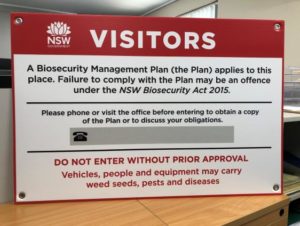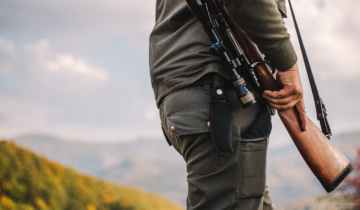African Swine Fever (ASF) is an emergency animal disease. ASF affects both domestic and feral pigs and is
spread via infected pig meat, pig-to-pig contact, soft tick-to-pig contact and via fomites (materials and equipment). There are no health risks for humans from ASF. People can safely continue to eat pork, regardless of detection of ASF.

ASF is continuing its spread throughout Asia. It is highly infectious and has no cure. If it enters Australia, with a mortality rate of up to 100%, ASF will have devastating effects on our domestic and feral pig population and our pig industry and economy. We need hunters in the front line to detect this devastating disease to assist our farmers and the community.
What can hunters do to prevent the spread of ASF?
There is no cure or vaccine available for ASF. Everyone, including hunters, has a responsibility to undertake practical measures to prevent, minimise or eliminate this biosecurity risk. To minimise the risk of ASF, hunters should:
Recognise ASF in pigs
Signs and symptoms of ASF include blotching of the skin, incoordination, diarrhoea, vomiting and pneumonia. Other signs may include groups or multiple sick or dead pigs, abnormal behaviours, lack of escaping, more prone to vehicle collisions and wobbly walking or trembling hind legs.
More information, including images of what to look out for, are available in the Recognising exotic diseases of pigs Primefact on the DPI website.
See. Report. Protect.
To prevent the spread, it is most important that you immediately report anything unusual you see (including sick or dead pigs) to the Emergency Animal Disease Watch Hotline on 1800 675 888.
You can also contact your Local Land Services on 1300 795 299, or a NSW Department of Primary Industries veterinarian or regulatory officer.
Be mindful about transporting pigs
In NSW, it is against the law to keep or transport a live feral pig. If you suspect any pigs are infected, please report it and do not transport it to reduce the potential spread of disease.
Keep pork on your fork
- The ASF virus can persist in infected pig meat for months and while it is not a human health risk to consume it, swill feeding (feeding food scraps to pigs) can spread the disease. It is against the law to feed pigs swill, including meat, meat products and anything that has come into contact with meat or meat products. This even includes the humble cheese and bacon roll!
- To be safe, keep your food secure while hunting, and take all leftovers home to avoid any accidental swill feeding.
Keep it clean
The ASF virus can persist in pig carcasses and the environment (in pig faeces, blood and urine). It can also be transferred via your equipment.
- Follow requirements included in Biosecurity Plans by always checking in with the producer who owns the land to ensure records of the visit can be maintained, and follow any specific advice for that property as directed.
- Thoroughly check and clean your boots, socks, equipment, bikes, boats and vehicles for blood, faeces and urine. Ensure all mud, soil and debris collected during your hunts is removed and left on site.
- Before leaving the property, disinfect the soles of your footwear, gaiters and packs using a spray bottle filled with disinfectant. Use methylated spirits (70-100%), bleach (diluted to 25%) or F10 disinfectant solution.
- Care for your hunting companions, by ensuring hunting dogs are not at risk of spreading disease. Ideally wash hunting dogs with water to remove any blood, faeces or urine, or at least, allow them to dry thoroughly and then brush / wipe them down to leave the dried material behind.
- Ensure all vehicles, equipment, people and pets are clean when entering a property and clean when you leave, preventing any unwanted disease spread.
- If you have contact with domestic pigs after hunting, only interact with them once you, your companions and any shared equipment have been cleaned. A,change of clothes, a soapy shower and clean hair will help stop the potential spread of ASF.
Where can hunters find more information?
For more information about ASF please visit the NSW Department of Primary Industries website.
This article was written jointly by the NSW Department of Primary Industries and Local Land Services.



